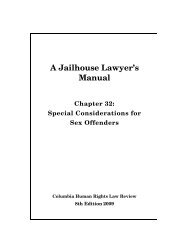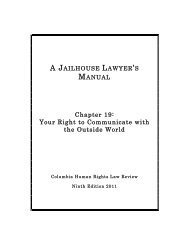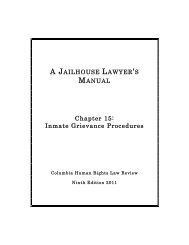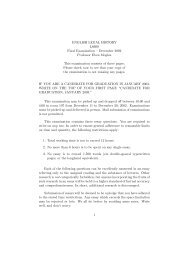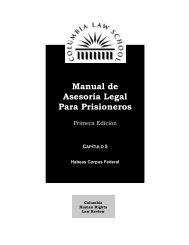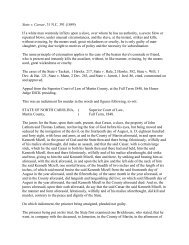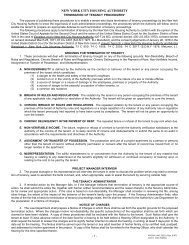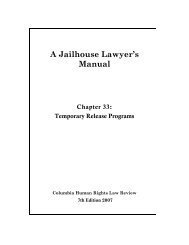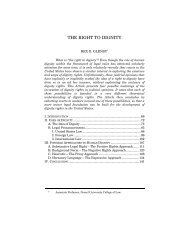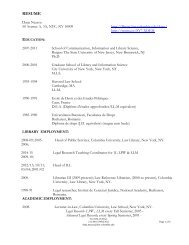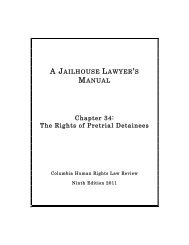A Right to Media? Lorie M. Graham - Columbia Law School
A Right to Media? Lorie M. Graham - Columbia Law School
A Right to Media? Lorie M. Graham - Columbia Law School
You also want an ePaper? Increase the reach of your titles
YUMPU automatically turns print PDFs into web optimized ePapers that Google loves.
494 COLUMBIA HUMAN RIGHTS LAW REVIEW [41:429<br />
According <strong>to</strong> one indigenous broadcaster, “the recognition of Maori<br />
language and the need for Maori broadcasting were particular<br />
landmark cases” coming from the commission of inquiry. 260 This<br />
recognition allowed for more government support of Maori media.<br />
According <strong>to</strong> the most recent census, about one in seven<br />
people in New Zealand consider themselves Maori, and one in four<br />
Maori speak an indigenous language. 261 Despite such a considerable<br />
population, little Maori programming existed through state-owned<br />
broadcasting until recently. 262 In fact, throughout much of New<br />
Zealand’s his<strong>to</strong>ry, “mainstream news media . . . played a central role<br />
in processes of colonization; being used as a <strong>to</strong>ol for convincing<br />
colonizing and colonized groups that what was occurring was in the<br />
interests of ‘everyone.’” 263 When the Maori opted <strong>to</strong> protest their<br />
treatment at the hand of the government, media coverage was often<br />
dismissive of Maori concerns, labeling them “unreasonable and<br />
unnecessarily hostile” <strong>to</strong>ward the interest of society. 264 Joris de Bres,<br />
the Race Relations Commissioner for New Zealand, notes that<br />
“[w]hen the public is fed a diet of predominantly negative s<strong>to</strong>ries<br />
about Maori, it is hardly surprising that negative attitudes are<br />
fostered. This impacts on one-<strong>to</strong>-one relationships between Maori and<br />
Pakeha [non-Maori].” 265<br />
While more needs <strong>to</strong> be done <strong>to</strong> reverse this trend, major<br />
changes are taking place with the advent of new media sources such<br />
Waitangi—A Century Ahead, 28 Aboriginal L. Bull. 6 (1987), available at<br />
http://www.austlii.edu.au/au/journals/AboriginalLB/1987/47.html (explaining<br />
that the Waitangi Tribunal found deficient the government of New Zealand’s<br />
protection of the Maori language in the areas of education, justice, and<br />
broadcasting). See generally Wena Harawira, HOD News and Current Affairs,<br />
Maori Television, Challenges Facing Indigenous Broadcasters, Address<br />
at Pacific <strong>Media</strong> Summit (Apr. 16, 2008), available at<br />
http://www.pcf.org.nz/archive/pacific_media_and_human_rights<br />
(follow<br />
“Challenges facing indigenous broadcasters” hyperlink) (describing the<br />
development of Maori <strong>Media</strong> and the work of the Waitangi Tribunal).<br />
260. Harawira, supra note 259 (noting that the Tribunal’s “decisions are<br />
not binding but they have made an impact in areas such as protecting Maori<br />
interests . . . and providing a public forum where the damage wrought in the past<br />
can be aired and acknowledged.”).<br />
261. David, supra note 212, at 31.<br />
262. See Harawira, supra note 259.<br />
263. Hodgetts et al., supra note 2, at 192 (citation omitted).<br />
264. Id. at 191–192.<br />
265. Bad News–Maori and the <strong>Media</strong>, PSA J. (N.Z. Pub. Serv. Ass’n,<br />
Welling<strong>to</strong>n, N.Z.), Sept. 2003, at 18.



